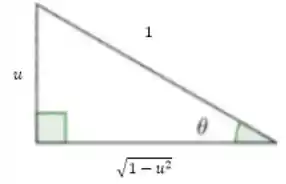Calcule a integral indefinida.
Passo 1
Primeiramente vamos pegar o e desenvolver a Identidade Pitagórica.
Montando o triângulo temos

Com base nesse triângulo vamos usar a seguinte relação trigonométrica
Passo 2
Agora vamos aplicar a seguinte substituição chamar e também as mudanças necessárias.
Passo 3
Vamos aplicar a Identidade Trigonométrica e substituir por .
Passo 4
Agora podemos resolver a integral e em seguida desfazer as mudanças através da relação trigonométrica e as do triângulo montado anteriormente e .